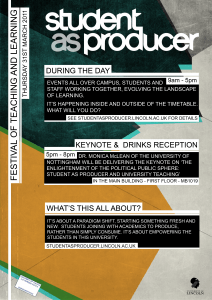Student as Producer has been getting a lot of very positive coverage recently in The Guardian’s Higher Education Network website:
On the 22nd of September the website featured an article Mike Neary had written on Student as Producer: Reinventing the Undergraduate Curriculum.
On the 11th of October Student as Producer was the central item in an article about putting student engagement at the heart of higher education.
On the 18th of October The Guardian published an article, written by Joss Winn and Mike Neary, where they argued that hackers are vital to higher education’s culture of openness and innovation.
In the meantime, Mike Neary and Dan Derricott, last year’s Vice President for the Student’s Union at Lincoln, have been asked to be panel members for online group discussions about the future of Higher Education.
All of this shows very cleary the amount of interest there is around the sector for Student as Producer and the impact this project is having.
